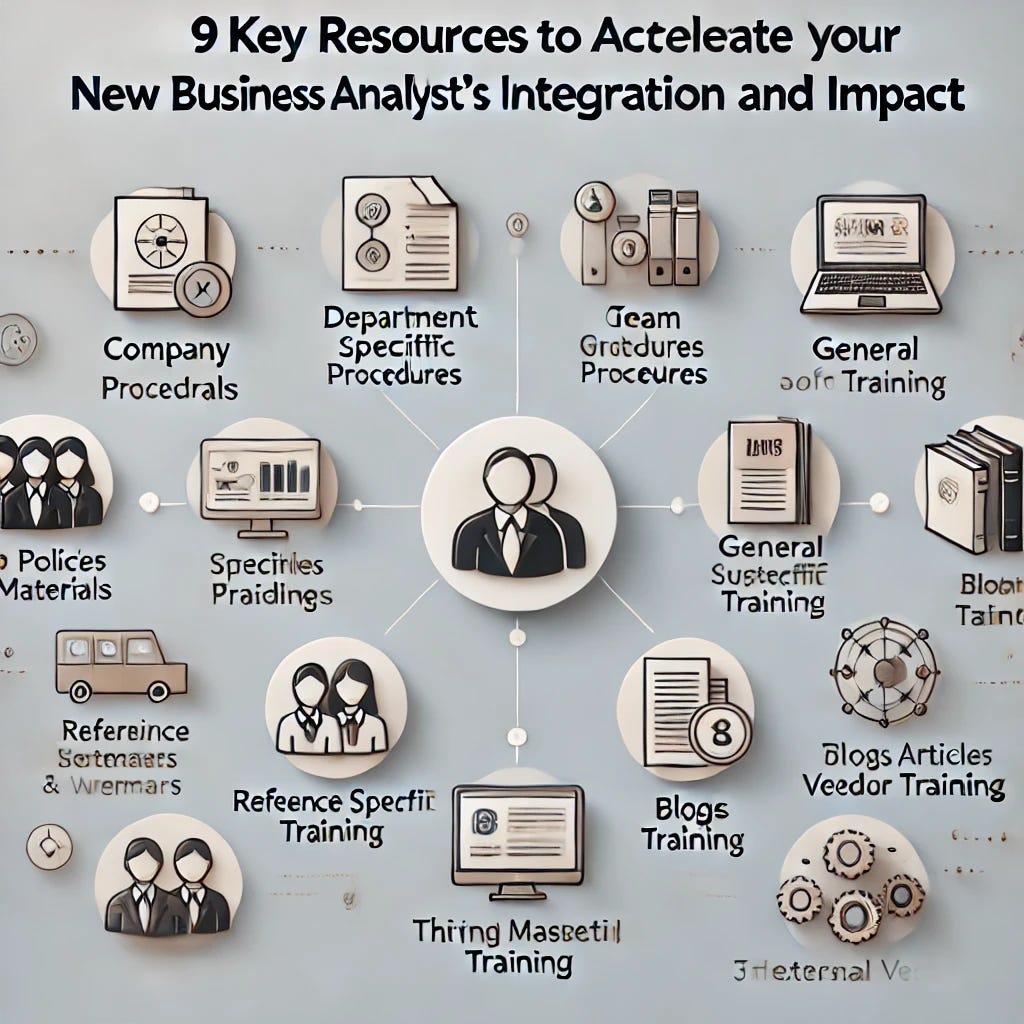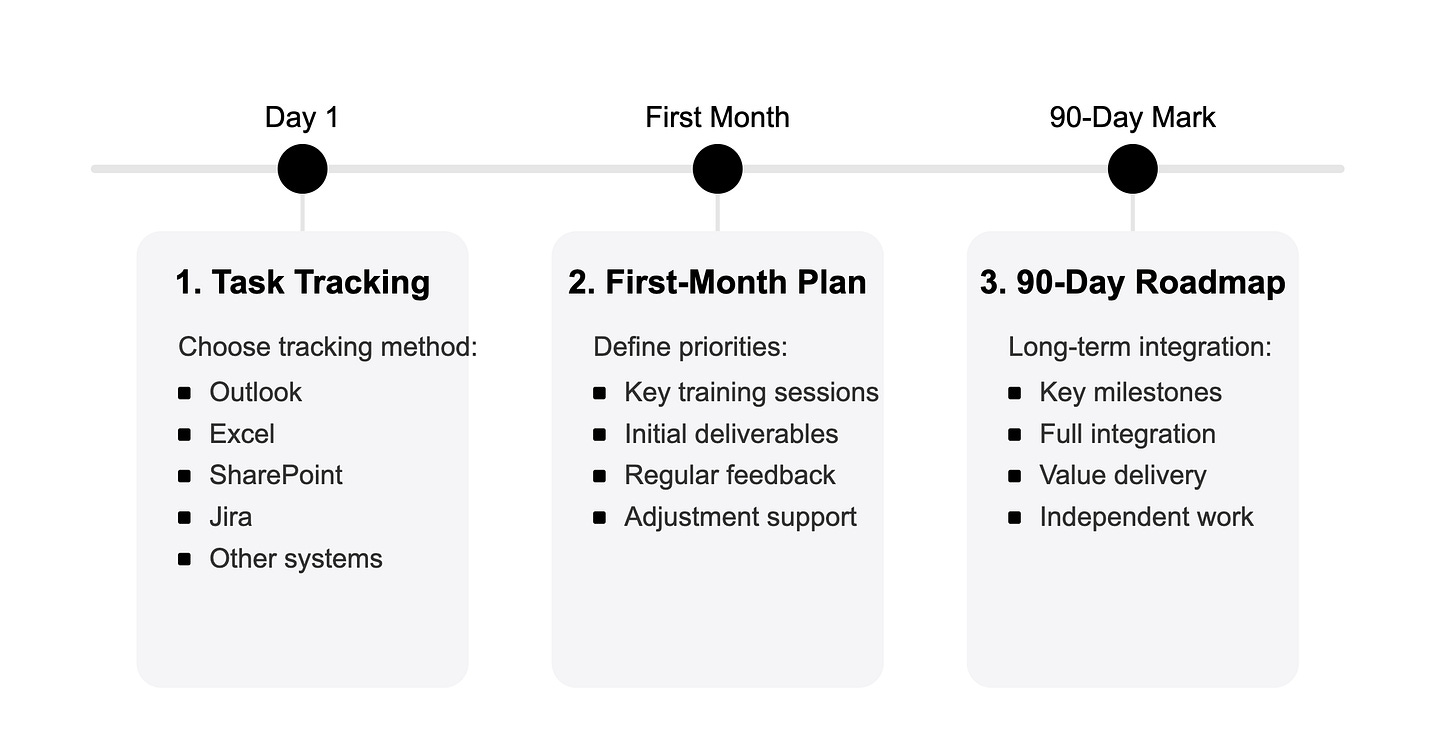Essential Onboarding Guide: Setting Your New Business Analyst Up for Success
How to Ensure a Smooth Onboarding for a New Business Analyst
Bringing a new Business Analyst (BA) into your team is more than just filling a position—it’s an opportunity to enhance efficiency, streamline processes, and drive better business outcomes. However, without the right onboarding strategy, even the most skilled BAs can face unnecessary roadblocks.
A structured onboarding plan ensures that your new BA not only understands their role but can also contribute effectively from day one. From company policies to specialized training, having the right resources in place can make all the difference.
So, what does a smooth onboarding process look like? Here are nine essential resources that will help your new Business Analyst integrate quickly and add value to your organization.
9 Key Resources to Accelerate Your New Business Analyst’s Integration and Impact
1. Company Policies and Materials
Most companies have general onboarding materials that cover key policies and procedures. These include time tracking, workplace safety, travel policies, and other essential rules. Ensure the new BA has access to these documents so they can get familiar with the company’s overall operations. Having all relevant materials in one place can make the first days much easier.
2. Department-Specific Procedures
Whether the BA will work in finance, IT, or operations, understanding the department’s specific business processes is crucial. A clear overview of workflows and responsibilities will help them quickly integrate and contribute effectively.
3. Team Guidelines and Internal Handbook
Every team has its own way of working. The new BA should be introduced to the team’s rules, documentation standards, and best practices. This ensures consistency in how reports, analyses, and project documents are created and managed from day one.
4. General Software Training
Most organizations use software tools for project management, reporting, and communication. A structured introduction to these tools—including their key modules, data structures, and integrations—will help the BA navigate their new work environment efficiently. If no such training exists, creating one should be a priority.
5. Role-Specific Training
BAs often specialize in particular internal processes, and this knowledge is best transferred through individual training. A business owner or an experienced team member should provide a deep dive into relevant processes, offering insights that will help the new BA excel in their role.
6. Reference Materials and Books
Every organization should have a library of reference materials, including books on methodologies, industry best practices, and technical guides. Highlighting key readings—whether on soft skills, analysis techniques, or technical knowledge—can give the new BA a strong foundation. Staying updated with industry publications also helps maintain expertise.
7. Learning Management System (LMS)
If your organization has a Learning Management System, leverage it for structured onboarding. These platforms help track progress, automate training processes, and ensure all necessary steps are completed. An LMS can make onboarding more efficient and less time-consuming for both the new BA and the management team.
8. Blogs, Articles, and Webinars
Quality online resources can supplement internal training. Providing a curated list of blogs, articles, and webinars related to business analysis can help new hires gain industry insights and develop their skills further. Platforms like Analyst Harbor offer valuable updates and discussions on key BA topics.
9. Third-Party Vendor Training
If your company relies on third-party software or services, check whether vendors offer training sessions. These can be technical courses or practical workshops that accelerate the onboarding process. Engaging with external experts can provide a deeper understanding of the tools and solutions used within the company.
Planning for Long-Term Success
Once you have these resources in place, structuring a detailed onboarding plan becomes much easier. A well-thought-out plan not only clarifies expectations but also helps track progress. Here are four key steps to include:
Checklist for the First Days – The initial days can be overwhelming. A structured checklist ensures no critical steps are missed, helping both the new BA and their manager stay organized.
Task Tracking – Decide how onboarding tasks will be monitored—whether through Outlook, Excel, SharePoint, Jira, or another system that fits your company’s workflow.
First-Month Plan – Define the most important training sessions and deliverables for the first month. Providing feedback during this period is essential to ensure a smooth adjustment.
90-Day Roadmap – Beyond the initial onboarding, a long-term plan should outline key milestones for the first three months. By the end of this period, the new BA should be fully integrated and delivering real value to the organization.
Having a structured onboarding process is an investment in the success of both the Business Analyst and the organization. With the right support and resources, a new BA can quickly become a driving force behind better decision-making and business growth.
Key Takeaways: Setting Your New Business Analyst Up for Success"
Structured Onboarding: A well-planned onboarding process ensures new Business Analysts (BAs) integrate quickly, understand their role, and contribute effectively from day one.
Essential Resources: Key resources for onboarding include company policies, department-specific procedures, team guidelines, software training, and role-specific training.
Continuous Learning: Leveraging reference materials, Learning Management Systems (LMS), external blogs, and third-party vendor training helps maintain expertise and accelerates the BA’s learning curve.
Final Thoughts
A comprehensive onboarding plan with the right resources is crucial for setting new BAs up for long-term success and enabling them to drive innovation and business growth. In the next article, we'll outline a detailed onboarding plan.
Join Analyst Harbor today and start enhancing your business analysis skills! We look forward to welcoming you to our community. 😊



